If you don’t know much about el Día de los Muertos (the Day of the Dead), it’s time to get familiar. This Mexican holiday is full of beautiful customs, meaningful traditions, and absolutely delicious food. It is believed that on the Day of the Dead, the spirits of the deceased are allowed to return to their living loved ones. To welcome back these spirits, families and friends gather to honor those who have passed with feasting, dancing, colorful costumes, and music.
And while Mexican cuisine is a probably a favorite of everyone already, these celebratory dishes may be unfamiliar to those outside of the culture. This holiday is celebrated throughout South America, and every region is bursting with their own takes on these dishes, ready to be shared and enjoyed with loved ones, both living and departed. These are a few of our favorites.
Pan de Muerto (Day of the Dead bread)
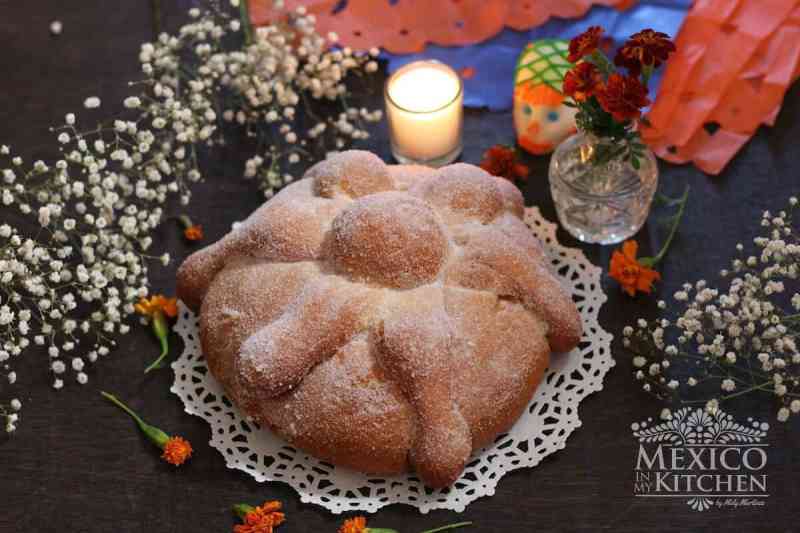
(From Mexico in my Kitchen)
Pan de Muerto is the dish of the holiday, as it is believed by some that it is this bread itself that calls forth the spirits of the lost. It is meant to be both an offering to the departed, as well as a remembrance for the living. Deliciously buttery and sweet, these beautiful loaves will be perfect on your celebratory table.
Makes 2 loaves
Ingredients:
- 4 cups all purpose flour
- 2 tablespoons active-dry yeast
- 1/2 cup sugar, plus more for dusting
- 1 teaspoon salt
- 8 tablespoons butter, separated
- 6 tablespoons unsalted margarine, plus more for greasing pans
- 5 eggs, 4 whole plus one beaten for brushing
- Zest from 2 oranges
- 1/4 cup warm water
- 1 teaspoon orange blossom water
Method:
-
Using the hook attachment of a stand mixer, mix 4 eggs, margarine, salt and 1/4 cup sugar and mix for about 2 minutes. Add in flour and water in small amounts, alternating between the two. Mix in dry active yeast.
- To the mixture, add butter, orange zest, orange blossom water, and 1/4 cup sugar, mixing well until dough comes together.
- Transfer the dough to a lightly floured work surface work surface and knead until smooth.
- Grease the interior of a large bowl and place dough inside, covering with plastic wrap. Let rest in a warm place until the dough doubles in size, about 45 minutes.
- Move dough back to working surface, removing roughly a 1 1/2 cups of the dough for the decorative bones later on.
- Cut the rest of the dough into two equal pieces.
- Grease two baking sheets, and set aside.
- Shape both larger pieces of dough into balls and flatten slightly, place onto prepared baking sheets.
- Shape the reserved smaller dough piece four into bones, rolling and pinching to create the right shape. Make two bones for each loaf.
- Place bone pieces on each loaf.
- With the leftover dough, form small balls, and place them atop the loaves.
- Cover baking sheets with plastic wrap and let rise in a warm place until buns have doubled in size, 1 ½ to 2 hours.
- Nearing the end of the rising time, preheat oven to 350F.
- Brush each loaf with beaten egg and 1 tablespoon of water.
- Bake until golden brown, 15 to 17 minutes.
-
Once Pan de Muerto loaves have cooled, brush with remaining butter and dust with sugar.
Fiambre (Guatemalan composed salad)
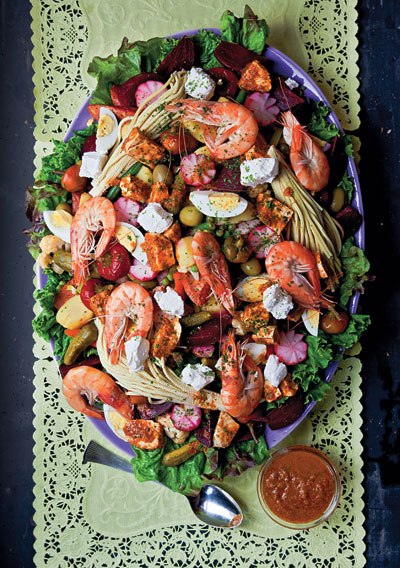
(From Saveur)
Like many of the other dishes on this list, fiambre is a dish that varies according to region and family. Many families have a special recipe that’s been passed from one generation to the next. While we absolutely love the variety, this special salad can contain over 50 ingredients, so if you plan on serving this at your celebration, you’d better get to chopping and slicing now.
Ingredients:
- 3/4 cup chopped parsley
- 1/2 cup cup white wine vinegar
- 2 tablespoons capers, drained
- 1 tablespoon Dijon mustard
- 6 scallions, roughly chopped
- 1 (7 ounce) jar pimientos, drained
- 1 clove garlic, sliced thin
- 1 (1 inch) piece ginger, sliced thin
- 1 cup olive oil
- Kosher salt and ground black pepper, to taste
- 1 pound boneless, skinless chicken breasts, poached and cut into 1 inch cubes
- 1 pound medium head-on, un-peeled shrimp, boiled
- 1 pound peeled Yukon gold potatoes, boiled and halved
- 8 ounces cooked uncured chorizo sausage, cut into 1/4 inch slices
- 8 ounces cooked linguiça sausage, cut into 1/4 inch slices
- 4 ounces green beans, trimmed and boiled until tender
- 3 ounces salami, cut into 1/2 inch strips
- 3 ounces ham, cut into 1/2 inch strips
- 1 cup frozen peas
- 4 medium carrots, cut into 1/2 inch rounds, boiled until tender
- 4 ribs celery, cut into 1/2 inch slices, boiled until tender
- 1 head cauliflower, cut into florets, boiled until tender
- 4 medium beets, roasted, peeled, and quartered
- 1 small head green leaf lettuce, leaves separated
- 1 small head red leaf lettuce, leaves separated
- 8 ounces farmer’s cheese or feta
- 3 ounces mini gherkins, drained
- 3 ounces Spanish olives, pitted
- 5 radishes, quartered
- 4 boiled eggs, quartered
- 3 pacayas (palm tree blossoms)
Method:
-
Blend 1/2 cup parsley, vinegar, capers, mustard, scallions, pimientos, garlic, and ginger together. Slowly drizzle in oil until emulsified; season with salt and pepper and set vinaigrette aside.
-
In a large bowl, pour 3/4 cup vinagrette over chicken, shrimp, potatoes, chorizo, linguiça, green beans, salami, ham, peas, carrots, celery, and cauliflower.
-
In a separate bowl, toss beets with 1/4 cup vinaigrette.
-
Cover both bowls and chill 30 minutes.
-
Arrange lettuce on bottom of a large platter; top with marinated meats and vegetables. Garnish with beets, cheese, gherkins, olives, radishes, eggs, and pacayas. Garnish with remaining parsley.
Mexican atole (warm cornmeal drink)
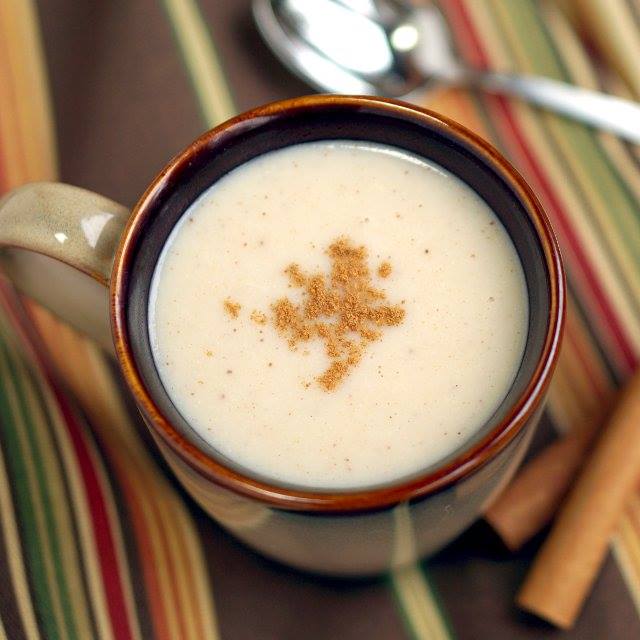
(From Curious Cuisiniere)
We are all probably familiar with the spicy sweet version of Mexican hot chocolate, but this is another hot beverage that we’d argue is just as heavenly. Known as the “drink of the gods”, this warm and comforting treat is perfect for a chilly autumn night’s celebration. Atole is often part of the Day of the Dead festivities as the celebration often lasts late into the cold night.
Ingredients:
- 1/2 cup masa harina
- 3 cups water
- 1 cup milk, 2% or whole
- 1/4 cup grated piloncillo, or brown sugar (more if desired)
- 1 teaspoon cinnamon
- 1 teaspoon pure vanilla extract
Method:
-
In a medium saucepan, whisk together masa harina, water, milk, piloncillo (or brown sugar), and cinnamon. Simmer over medium high heat, whisking frequently.
- Reduce the heat to medium and simmer the mixture for 5-10 minutes, whisking until desired thickness is reached.
- Remove from the heat and whisk in the vanilla. Serve warm.
Calabaza en tacha (candied pumpkin)
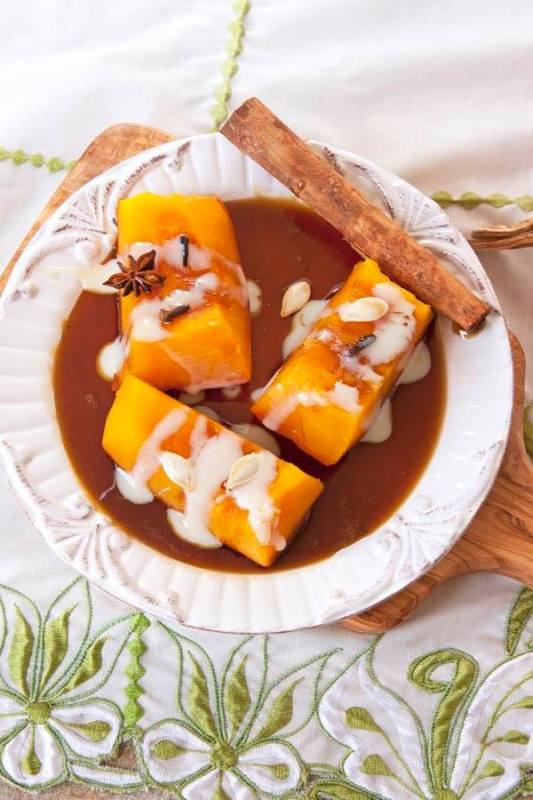
(From Muy Bueno Cookbook)
This delicious dessert is very traditional for Dia de Muertos. Versions of the dish vary according to region, but most include cooked pumpkin that’s served with piloncillo syrup and cinnamon. While this may be traditional for Day of the Dead, we think this beautiful fall treat deserves a spot at the table much more often.
Ingredients:
- 4-to 5 pound pumpkin
- 2 cups water
- 3 cinnamon sticks
- 5 whole cloves
- Sweetened condensed milk, to finish
Spiced Piloncillo Syrup
- 1/4 cup water
- 1 cinnamon stick
- 8 ounces piloncillo, or 1 cup packed dark brown sugar
Method:
-
Using a serrated knife, cut the pumpkin in half and scoop out the pumpkin seeds and pulp, discard. Cut the pumpkin into 3- to 4-inch slices, leaving the skin on.
-
In a large pot, combine water, cinnamon, and cloves. Add the pumpkin and steam until pumpkin is tender, 20-40 minutes.
-
To make the piloncillo syrup, cook water, cinnamon stick, and piloncillo on a very low heat until the piloncillo melts, stirring frequently.
-
Serve slices of pumpkin with syrup and drizzle with sweetened condensed milk.
Calavera de Azúcar (Sugar Skulls)
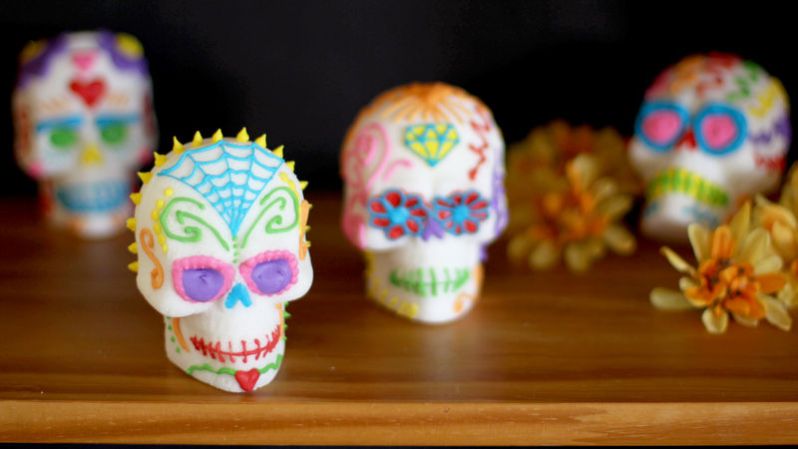
(From Tablespoon.com)
These sugary skulls are not for eating, but for decorating and paying homage. According to tradition, each skull can represent a departed loved one, and be decorated accordingly with that person’s name, favorite colors, likeness, etc. It is believed that creating something in the likeness of a lost loved one can help revive their spirit for the celebratory day.
To make these, you will need special skull molds, which can be found at many stores this time of year, or on Amazon.
Makes 4 medium-sized skulls
Ingredients:
- Gel food color
- 1/4 cup meringue powder
- 6 cups granulated sugar
- 1/3 cup water
- 7 1/2 teaspoons meringue powder
- 6 teaspoons water
- 1 pound powdered sugar
Method:
-
Mix the sugar, meringue powder and water together until all the granules of sugar are wet and stick together well.
- Fill both sides of skull molds with the sugar mixture until well compacted, scraping off excess.
- Cover a large plate or cutting board with parchment paper, then carefully invert skulls onto it, removing the molds.
- Set in a safe place to dry for 12-24 hours, flipping over halfway through the process so that both sides may dry.
- To make icing, beat together powdered sugar, meringue powder, and water until shiny and will hold stiff peaks.
- When skulls are dry, spread a thin layer of royal icing on the flat part of the back side of each skull and press together to make a full skull shape. Allow the skulls to dry for at least an hour.
- Separate icing into several small bowls and color each with different food colorings.
- Using piping bags, decorate your skulls with any design you choose.
- Allow your sugar skulls to dry for several hours before using them as decorations for your Day of the Dead event.



